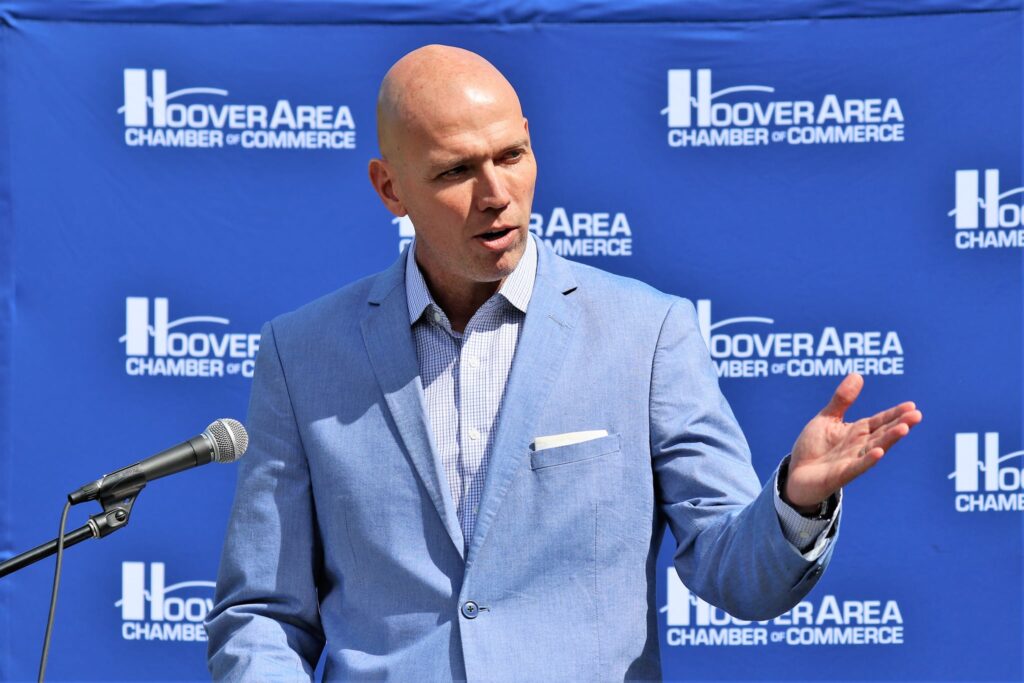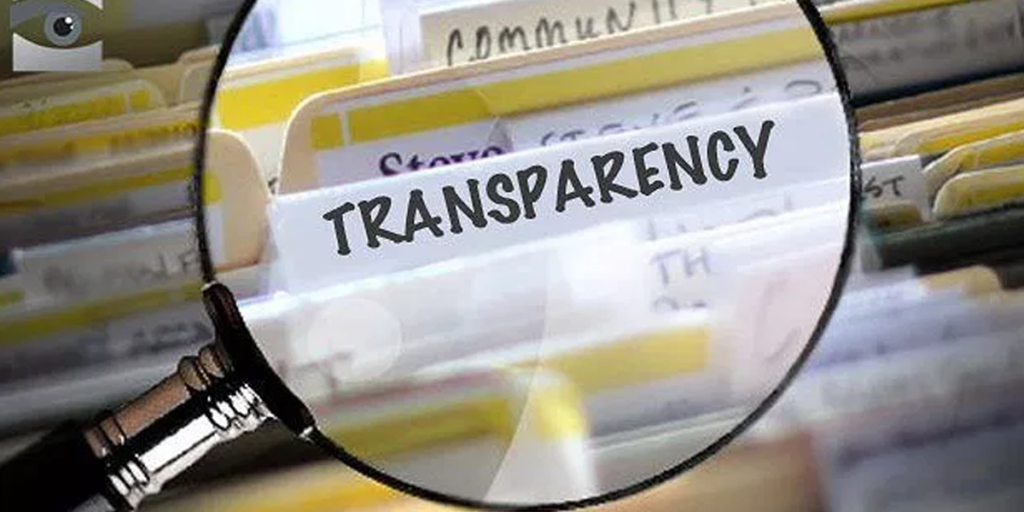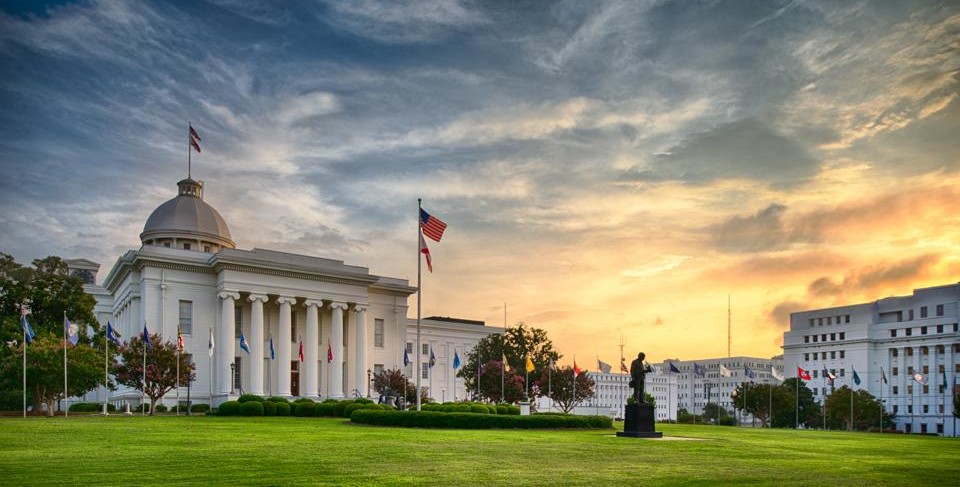Apryl Marie Fogel: Hoover City Council President John Lyda’s Quarterback Fake

Here in Alabama, football is beloved; there’s nothing like an unexpected play in a big game, something like a quarterback fake—a play requiring skill and precision akin to a magician’s sleight of hand. But while deception entertains on the field or stage, it’s troubling in local politics. Hoover has been rocked of late by confounding admissions, accusations, and unanswered questions, dividing the city council and fracturing relationships. Some are unaware of the turmoil at City Hall, while others ponder the way forward. City leaders, led by Mayor Frank Bracoto and Council President John Lyda, have sought to downplay or ignore question upon question and issue upon issue. City Administrator Ken Grimes followed their lead earlier this week and responded to concerns posed by residents on Facebook. Though the story he was responding to provided video evidence of a direct quote by the CFO and statements made in sworn testimony by the mayor, Grimes called it “junk taken out of context.” He didn’t clarify whether it was the mayor’s comments or the CFO’s that he believed was junk or what additional context he thought was needed to understand why a lease was signed before the costs were known or why the mayor said under oath that he hadn’t read it. Observers agree that the unfolding saga is more complex than officials admit, and a resolution is unlikely unless transparency improves. Could these issues be a series of unintentional and unrelated fumbles? Perhaps, but why would those involved leave them lingering and unaddressed for so long? For several years now, Lyda, Brocato, and their supporters have treated nearly every inquiry of questionable behavior as mere distractions rather than cause for concern. Until now, different situations have been treated as one-offs rather than a pattern, but a clear pattern is emerging, and I’m here to lay it all out for you in story form. Why story form? While not exactly boring in these circumstances, the interworkings of city government aren’t particularly riveting either. The facts laid out here are just that: facts. They stem from dozens of interviews, reviewing dozens of media stories, council meeting videos (no thanks to the city), searching for documents buried in dense public meeting packages, and reviewing audio recordings of testimony from the sparsely attended recent hearings. The city itself has been…less than helpful. Buckle up for a true story told in parts to bring the many converging details together for the first time. This is, without a doubt, just the beginning. Chapter 1: Darkness Slowly But Steadily Descends on the Field Once upon a time, Hoover seemed to have a government guided by the conservative values of small government, fiscal responsibility, transparency, and accountability. However, as the city’s population, economy, and infrastructure grew, sunshine faded on the public information accessible to those who live, work, and do business there. I live in neighboring Birmingham and heard the city was overwhelmingly conservative, so imagine my surprise when I learned that while the state was going forward, Hoover was going backward with public information. Around August 2021, city officials sparked controversy by deleting years of council meeting videos from their official YouTube channel without notice or explanation. When confronted, no one would take responsibility for the decision. The city attorney, Phillip Corley, told The Hoover Sun, “This was a council policy communicated by the council president to the city clerk.” The Sun asked follow-up questions about the conflicting information from the City Attorney and evidence of when the videos were discovered missing, and his questions were ignored. The move to limit the availability and coverage of videos prompted the launch of The Hoover Channel, a YouTube page with over 200 videos created by Robin Schultz. He and his teenage grandson, Jackson Schultz, maintain the site. Based on what I witnessed at the last council meeting, Jackson did the technical camera work while Robin sought answers and accountability from the council himself. After the meeting, Jackson hurried his grandfather along to help him pack up the bags of equipment they used. After the council was questioned about the deletions, Lyda informally polled the council members and formalized a new policy. The new one restricted the city’s livestream. It would now end before the public comments section of the meeting, and the city was now not only allowed to delete the videos after 60 days or after minutes had been approved but required to do so. I’ve talked to multiple people about this, and not one person can explain the positive benefit of deleting the videos for the city if there’s no liability related to what has been done or said. Corley, the city attorney, defended the council’s actions. I’m paraphrasing here, but he essentially said residents who want public meetings, made and kept public using equipment they’ve paid for, are ungrateful little curious cash cows for the city who are lucky to get any video at all and should take what he and the council decided behind closed doors to give them and shut up. Okay, I added a lot of color to that last part. His actual quote was, “He advised the city that state law does not require meetings to be videoed or livestreamed, or for recordings of meetings to be made or preserved.” It’s worth noting that Corley’s name comes up again at least twice in this sordid series of stories. First, when the city increases the outside attorney budget by $500,000, and then when the mysterious forensic audit becomes public. These moves and curious cleanup, some would say coverup, were just the beginning. Residents and other sources have pointed out that the meeting minutes of city council meeting have also undergone changes over the last several years. Descriptions of council actions have become incredibly vague, often omitting crucial details of pre-vote discussions and questions/answers relevant to future research, reporting, and glorious editorial storytelling. Remember that these half-baked minutes are all the city attorney says the law requires them to do. If he and Lyda had their way, you would not
Cam Ward steps up to address weak open records law in upcoming session

Over a decade ago, Alabaster-Republican State Sen. Cam Ward, sat on the “Open Records Study Task Force.” Tasked with revamping the Alabama’s Public Records Law that was first enacted in 1923, the group worked to create “a clear and uniform process through which citizens may obtain access to public information and documents.” Flash-forward 13 years later and Ward joins a chorus of people, including State Auditor Jim Zeigler who addressed the issue just yesterday, who think it’s time to revisit the law yet again in the upcoming 2019 legislative session. Ward told Alabama Today he’s been noticed “multiple problems” with the law pop over throughout the state. “Now that technology has evolved, the loopholes [in the law] have started presenting themselves. We need to take action and close those loopholes,” said Ward. Alabama’s Public Records Law is a relatively short, sweeping statement found in Section 36-12-40 of the Alabama Code that dictates the public’s right to inspect and copy official documents from the executive, legislative, and judicial branches of the state government. The law has also been applied by the courts to various city, county, municipal, and state personnel, departments, boards, and commissions. The problem Ward, and many others, are finding with the law is that it does not prescribe enforcement procedures. Should a government official fail to respond to the records request, citizens and the media must choose between letting their questions go unanswered, or filing a costly lawsuit in hopes of getting the information. “These smaller newspapers in the State, they don’t have a budget for these lawsuits, and the average citizen who is trying to provide oversight to their government really doesn’t have the budget for that. It just shouldn’t be so much of a problem for the government to be transparent,” Ward told Inside Alabama Politics who first reported on the bill today. Ward thinks they ought to be a penalty system to change. “We need a clear clarification for penalties when officials don’t provide information, or fail to provide it without unreasonable delay,” Ward explained. “That said, we need to figure what an appropriate turn-around time for these documents should be. After all, ‘reasonable’ is defined in the eye of the beholder.” Ward believes with technology advances, it should be easier than ever to provide electronic document to a requester as government officials no longer need to make copies of the documents, and are able to send them electronically now easing the process. Weaknesses in the law There is no language that states how long the state has to respond to a public records request. Fees are not stipulated by law. One department may charge one fee, while another may charge something entirely different. The Department of Corrections, for example, requires a flat $25 fee for them to begin to process a request. Meanwhile the Secretary of State’s office requires $1.00 per copied page, rather than a flat fee. Not all agencies have a clear employee in charge of requests, thus making tracking down the correct person difficult. There is no defined appeals process when a requestor does not get what they were asking for.
How ALDOT and John Cooper are exploiting the weaknesses of the open records law

The Alabama Public Records Law is a series of laws designed to guarantee that the public has access to the records of government bodies at all levels across the state. But just because the law exists, doesn’t mean it’s easy to navigate, or even helpful for that matter. Alabama’s law, which can be found at statutes 36.12.40-41 and 41.13.1 – 41.13.44 of the Code of Alabama, has some glaring weaknesses that agencies have been exploiting, to hide facts from concerned Alabamians and lawmakers. Just this year we’ve seen the law fail both reporters and a state official. AL.com‘s Kyle Whitmire ran into problems when requesting information from Attorney General Steve Marshall‘s office. He was told his request was not public information: “State law provides that any such records as you request are not subject to disclosure,” Marshall’s public information officer, Mike Lewis wrote. “Section 12-21-3.1-3.1(b) of the Code of Alabama states that ‘Law enforcement investigative reports and related investigative material are not public records. Law enforcement investigative reports, records, field notes, witness statements, and other investigative writings or recordings are privileged communications protected from disclosure.’ Ala. Code SS 12-21-3.1(b) (2012).” Meanwhile State Auditor Jim Zeigler has run into this own issues when requesting public information from the Alabama Department of Transportation (ALDOT). In April, Zeigler sent a first letter to ALDOT Transportation Director John Cooper and ALDOT Chief Counsel William Patty requesting further information about an $87 million state-funded bridge projectin Baldwin County — which would be a second bridge to Orange Beach. Despite the fact he was elected to statewide office, his request went altogether ignored. In July, Zeigler doubled-down on his fact-finding efforts ands sent a second letter to Cooper and Patty requesting the information, giving them a deadline to respond of August 17. Yet, as of Sept. 6, Zeigler’s heard only one thing: crickets. Alabama Today has run it its own share of problems in dealing with ALDOT and information requests. We first reached out to Tony Harris, spokesman for ALDOT, on May 18 with our own questions about the bridge project. He called back that afternoon and promised a response the following week. Flash-forward to May 25 then again June 12, more empty promises of information that never came. Finally on Aug. 24, after previously asking Alabama Today to avoid submitting an official public records request, he tells us that is what we have to do if we want the information. That there are issues being held up in the courts (by the way, they’ve all been resolved) and he’s unable to answer otherwise. Which has left us scratching our heads — Alabama officials are clearly exploiting holes in the Public Records Law and giving Alabamians the run-around as they see fit. Defining public records The Code of Alabama takes the time to define what public records are: As used in this article, the term “public records” shall include all written, typed or printed books, papers, letters, documents and maps made or received in pursuance of law by the public officers of the state, counties, municipalities and other subdivisions of government in the transactions of public business and shall also include any record authorized to be made by any law of this state belonging or pertaining to any court of record or any other public record authorized by law or any paper, pleading, exhibit or other writing filed with, in or by any such court, office or officer. (Ala Code § 41.13.44) Despite a clear definition, the law fails to set specific parameters to make the law work for the good of the people. What the law’s lacking There is no language that states how long the state has to respond to a public records request. Fees are not stipulated by law. One department may charge one fee, while another may charge something entirely different. The Department of Corrections, for example, requires a flat $25 fee for them to begin to process a request. Meanwhile the Secretary of State’s office requires $1.00 per copied page, rather than a flat fee. Not all agencies have a clear employee in charge of requests, thus making tracking down the correct person difficult. There is no defined appeals process when a requestor does not get what they were asking for. This is the first in a series of stories about this issue. Check back frequently for more information.
“Stunning contradiction” in many states’ records laws: Legislatures frequently exempt themselves

State capitols are often referred to as “the people’s house,” but legislatures frequently put up no-trespassing signs by exempting themselves from public-records laws. That tendency was apparent when The Associated Press sought emails and daily schedules of legislative leaders in all 50 states. The request was met with more denials than approvals. Some lawmakers claimed “legislative immunity” from the public-records laws that apply to most state and local officials. Others said secrecy was essential to the deliberative process of making laws. And some feared that releasing the records could invade the privacy of citizens, creating a “chilling effect” on the right of people to petition their government. Without access to such records, it’s harder for the public to know who is trying to influence their lawmakers on important policy decisions. “The public has a right to know what their elected officials are doing, because it’s the people’s job to hold those folks politically accountable,” said Peter Scheer, executive director of the First Amendment Coalition, a San Rafael, California-based nonprofit that advocates for greater openness in government. All legislatures allow people to watch and listen to their debates. But an AP review of open-government policies found that many state legislatures allow closed-door caucus meetings in which a majority of lawmakers discuss policy positions before public debates. Others have restrictions on taking photos and videos of legislative proceedings. In some places, lawmakers have no obligation to disclose personal financial information that could reveal conflicts of interest. Legislators possess the power to change that but are sometimes reluctant to act. A bill advancing this year in Massachusetts, for example, would strengthen the state’s public-records laws by limiting fees and setting new deadlines for state agencies and municipalities to comply. Yet it would continue to exempt lawmakers. That mirrors the way things work in Washington, D.C. Congress exempted itself when it passed the national Freedom of Information Act 50 years ago. The president and his immediate staff also are exempt. By contrast, many governors are subject to state sunshine laws. In many states, the public-records requirements passed by lawmakers present “a stunning contradiction,” said Charles Davis, dean of the College of Journalism and Mass Communication at the University of Georgia and a former executive director of the National Freedom of Information Coalition. “I have just always found it astonishing that they would put those requirements on public officials throughout government and exempt themselves at the same time,” he said. To gauge compliance with public-records laws, the AP sent requests to the top Democratic and Republican lawmakers in all states and most governors seeking copies of their daily schedules and emails from their government accounts for the week of Feb. 1 to Feb. 7. Of the more than 170 lawmakers who responded by mid-March, a majority denied the requests by claiming they were legally exempt. The governors were slower to respond but more often provided the information. The legislative denials came from lawmakers of both parties, although slightly more from Republicans. In states where some lawmakers said “yes” and others “no,” it was more often the majority party lawmakers who denied the requests while a minority party leader complied. In Missouri, Senate President Pro Tem Ron Richard was asked in front of dozens of reporters and editors whether he would release his government emails and daily calendars. “All you have to do is ask for it, and I’ll give it to you. I don’t care,” Richard told those attending a statewide press association event in February. Yet when the AP subsequently submitted an open-records request, Richard reversed course. A Senate administrator responded on his behalf with a letter saying that individual lawmakers aren’t subject to the Missouri Sunshine Law. Richard, who is in his first year as the Senate’s top lawmaker, explained that he learned his predecessors had determined they were exempt, and he didn’t want to break with precedent. “I’m telling you I don’t hide anything in my emails. I just don’t do that,” said Richard, a Republican from Joplin. Mississippi House Speaker Philip Gunn responded with a denial letter asserting his emails and calendars were his personal property, not subject to the Mississippi Public Records Act and protected “under the doctrine of legislative immunity” dating back hundreds of years to English common law. Denial letters on behalf of Illinois’ top Democratic and Republican lawmakers said, among other things, that releasing the records could amount to a “clearly unwarranted invasion of personal privacy” for individuals who contacted lawmakers without expecting their names to appear in the news media. An attorney for Kentucky’s legislature said secrecy was needed “to encourage effective and frank communications.” “Arranging honors for our fallen heroes, seeking options for Kentuckians with substance abuse problems or counseling citizens regarding confidential problems are all in a day’s work for our members,” wrote Kentucky legislative general counsel Morgain Sprague. “These communications have always been protected by law.” If lawmakers followed the same open-records rules that apply to others in government, the potential for some sensitive content being revealed would not be a reason for denying access to all of their emails. Rather, they could redact or withhold particular emails covered by various sunshine law exceptions while releasing the rest. In several states, lawmakers who provided their records did withhold certain emails that they considered to be exempt from disclosure. Texas Lt. Gov. Dan Patrick, who is the Republican head of the Senate, released 48 pages of emails but withheld the rest pending a request for a state attorney general’s opinion on whether confidential communications between elected officials and citizens are shielded from disclosure. New Mexico lawmakers released hundreds of emails, mainly from constituents, but withheld three under an exemption for correspondence with certain legislative staff. They also released copies of their daily calendars showing breakfasts and dinners sponsored by industry and interest groups. Lawmakers in Florida, which has one of the more expansive sunshine laws, freely released emails from people urging them to support or oppose particular bills. They also released calendars showing


